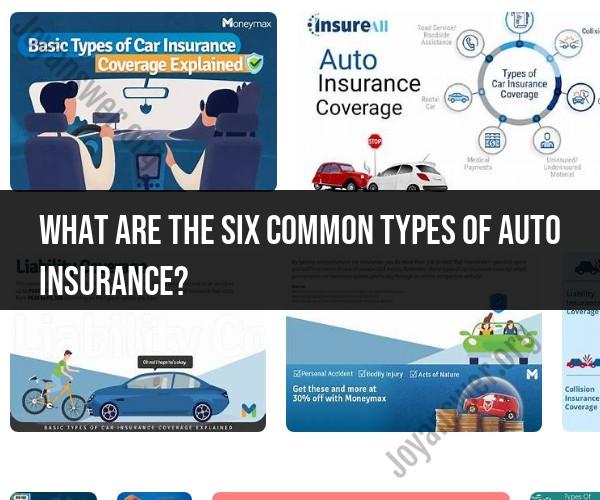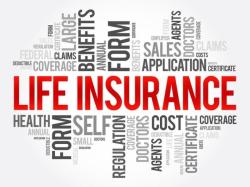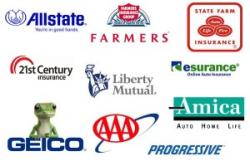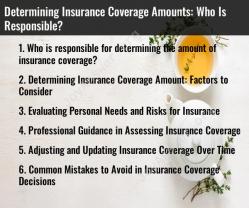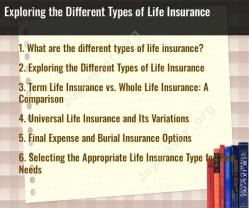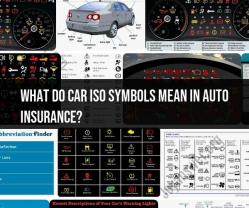What are the six common types of auto insurance?
Auto insurance typically consists of various types of coverage that provide protection for different aspects of your vehicle and driving-related risks. The six common types of auto insurance coverage are:
Liability Coverage:
- Bodily Injury Liability: This coverage pays for injuries and medical expenses incurred by other people in an accident for which you are at fault.
- Property Damage Liability: Property damage liability covers the cost of repairing or replacing another person's property (e.g., their vehicle) if you are at fault in an accident.
Collision Coverage:
- Collision coverage pays for damage to your vehicle when it collides with another vehicle or object, regardless of who is at fault. This coverage is helpful for repairing or replacing your own vehicle in case of an accident.
Comprehensive Coverage:
- Comprehensive coverage protects your vehicle from non-collision-related damage, such as theft, vandalism, natural disasters, or hitting an animal. It covers a wide range of incidents that can damage your vehicle.
Uninsured and Underinsured Motorist Coverage:
- Uninsured motorist coverage (UM) and underinsured motorist coverage (UIM) protect you if you are involved in an accident with a driver who has no insurance or insufficient insurance to cover your damages. UM and UIM can cover medical expenses and property damage.
Medical Payments (MedPay) or Personal Injury Protection (PIP):
- MedPay and PIP coverage help pay for medical expenses for you and your passengers, regardless of who is at fault. PIP is more comprehensive and may cover additional costs like lost wages and essential services.
Personal Property Coverage (Contents Coverage):
- This optional coverage, often offered with comprehensive coverage, reimburses you for the theft or damage to personal items inside your vehicle, such as electronics, luggage, or clothing.
In addition to these six common types of coverage, there are various optional coverages and endorsements that you can add to your policy for enhanced protection. These may include rental car coverage, roadside assistance, and gap insurance, among others. The specific coverage you need depends on your individual circumstances, such as your vehicle's value, your state's insurance requirements, and your risk tolerance.
It's important to carefully review your auto insurance policy and discuss your needs with an insurance agent to ensure that you have the right types and amounts of coverage to protect yourself, your vehicle, and your finances in the event of an accident or unforeseen circumstances.
Exploring the Six Common Types of Auto Insurance
Auto insurance is a contract between you and an insurance company that protects you financially in the event of an accident or other covered event. There are six common types of auto insurance:
- Liability coverage: Liability coverage pays for bodily injury and property damage that you cause to others in an accident. It is the most important type of auto insurance to have, and it is required by law in most states.
- Collision coverage: Collision coverage pays for damage to your own vehicle in an accident, regardless of who is at fault. It is not required by law, but it is a good idea to have if you are financing your vehicle or if you have a valuable vehicle.
- Comprehensive coverage: Comprehensive coverage pays for damage to your vehicle caused by events other than collisions, such as theft, vandalism, and weather damage. It is not required by law, but it is a good idea to have if you live in an area with a high crime rate or if you have a valuable vehicle.
- Medical payments coverage: Medical payments coverage pays for medical expenses for you and your passengers, regardless of who is at fault in an accident. It is not required by law, but it is a good idea to have if you do not have health insurance or if your health insurance does not cover auto accidents.
- Personal injury protection (PIP): PIP coverage pays for medical expenses, lost wages, and other expenses related to an auto accident, regardless of who is at fault. It is required by law in some states.
- Uninsured/underinsured motorist coverage: Uninsured/underinsured motorist coverage pays for bodily injury and property damage caused by an uninsured or underinsured driver. It is not required by law, but it is a good idea to have in case you are hit by an uninsured or underinsured driver.
What are the essential auto insurance coverage types you need to know?
The essential auto insurance coverage types are liability coverage and collision coverage. Liability coverage is required by law in most states, and it protects you financially in the event that you cause an accident and injure or damage someone else's property. Collision coverage is not required by law, but it is a good idea to have if you are financing your vehicle or if you have a valuable vehicle.
How to choose the right combination of auto insurance policies for your needs?
The right combination of auto insurance policies for you will depend on your individual needs and circumstances. Consider the following factors when choosing auto insurance coverage:
- Your state's minimum coverage requirements
- Your budget
- The value of your vehicle
- Your driving record
- Your risk factors, such as where you live and the type of car you drive
Understanding the differences between liability, comprehensive, and collision coverage.
Liability coverage pays for bodily injury and property damage that you cause to others in an accident. Comprehensive coverage pays for damage to your vehicle caused by events other than collisions, such as theft, vandalism, and weather damage. Collision coverage pays for damage to your own vehicle in an accident, regardless of who is at fault.
Are there additional or specialized auto insurance options beyond the basics?
Yes, there are a number of additional or specialized auto insurance options available, such as:
- Rental car reimbursement: Rental car reimbursement coverage pays for the cost of renting a car while your vehicle is being repaired after an accident.
- Towing and roadside assistance: Towing and roadside assistance coverage pays for the cost of towing your vehicle and providing roadside assistance, such as changing a flat tire or jumping a dead battery.
- Gap insurance: Gap insurance pays the difference between the amount you owe on your vehicle and its actual cash value in the event of a total loss.
- Usage-based insurance: Usage-based insurance programs track your driving habits and offer discounts to safe drivers.
When choosing auto insurance coverage, it is important to consider your individual needs and circumstances. Talk to your insurance agent to get help choosing the right coverage for you.
